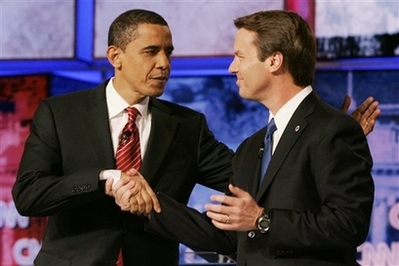Edwards gives long-awaited endorsement to Obama
(Agencies)
Updated: 2008-05-15 06:58
Updated: 2008-05-15 06:58
GRAND RAPIDS, Mich. - Democrat John Edwards is endorsing former rival Barack Obama, fresh signs of the party establishment embracing the likely nominee even as Hillary Rodham Clinton refuses to give up her increasingly long-shot candidacy.
Edwards was to appear with Obama in Grand Rapids, Mich., as Obama campaigns in a critical general election battleground state, the Obama campaign said Wednesday.
|
In this Monday, Jan. 21, 2008 file photo, Sen. Barack Obama, D-Ill., left, greets former Sen. John Edwards, D-N.C., before a Democratic debate sponsored by CNN and the Congressional Black Caucus Institute in Myrtle Beach, S.C. Edwards is endorsing Barack Obama as the Democratic Presidential nominee, it was announced Wednesday, May 14, 2008. [Agencies] |
The endorsement comes the day after Clinton defeated Obama by more than 2-to-1 in West Virginia. The loss highlighted Obama's work to win over the "Hillary Democrats" — white, working-class voters who also supported Edwards in large numbers before he exited the race.
Clinton campaign Chairman Terry McAuliffe said in a written statement, "We respect John Edwards, but as the voters of West Virginia showed last night, this thing is far from over."
Edwards, a former North Carolina senator and the 2004 vice presidential nominee, dropped out of the race in late January.
Both Obama and Clinton immediately asked Edwards for his endorsement, but he stayed mum for more than four months, even as the campaign focused on his home state in recent weeks.
Edwards considered making an endorsement in the weeks after leaving the campaign. People who talked to Edwards privately at the time said he was concerned about Obama's readiness for the presidency and his electability. Clinton worked harder to woo both Edwards and his wife and impressed them both, those Edwards confidants said, but Edwards would have had a hard time endorsing her after criticizing her so much during the primary.
A person close to Edwards, speaking on condition of anonymity because the individual wasn't authorized to talk to the media, said the former lawmaker wanted to get involved now to begin unifying the party. Obama also signed on to Edwards' anti-poverty initiative, which he launched Tuesday with the goal of reducing poverty in the United States by half within 10 years.
When he made his decision, Edwards didn't even tell many of his former top advisers because he wanted to make sure that he personally talked to Clinton to give her the news, said the person close to him. Edwards' wife, Elizabeth, who has said she thinks Clinton has the superior health care plan, did not travel with him to Michigan and is not part of the endorsement.
David "Mudcat" Saunders, a chief adviser for Edwards on rural affairs during his presidential campaign, said the timing of the endorsement couldn't be better given Obama's resounding loss in West Virginia on Tuesday.
"For Barack Obama, I think he ought to kiss Johnny Edwards on the lips to kill this 41-point loss," he added. "The story is not going to be the 41-point loss. It's going to be Edwards' endorsement."
Edwards said in the past week that Obama would likely be the party's presidential nominee and that Clinton must be careful not to damage the party's prospects in November as she continues her campaign.
Edwards waged a scrappy underdog campaign for the Democratic nomination, always outshone by the historic nature of Obama possibly being the first black nominee and Clinton the first woman. But Edwards was considered their strongest contender, even as he balanced the rigors of the campaign with the personal blow of Elizabeth's returning breast cancer.
Edwards promoted progressive policy ideas and came in second to Obama in Iowa before coming in third in the following three contests and dropping out in New Orleans, the location a reminder of his attention to poverty.
Obama has a total of 1,887 delegates, leaving him just 139 delegates short of the 2,026 needed to clinch the nomination. Clinton has 1,718 delegates, according to the latest tally by The Associated Press.
Edwards has 19 pledged delegates won in three states: Iowa, New Hampshire and South Carolina. Most of the those delegates have already been selected, meaning they are technically free to support whomever they choose at the party's national convention, regardless of Edwards' endorsement.
|
||
|
||
|
|
|
|
